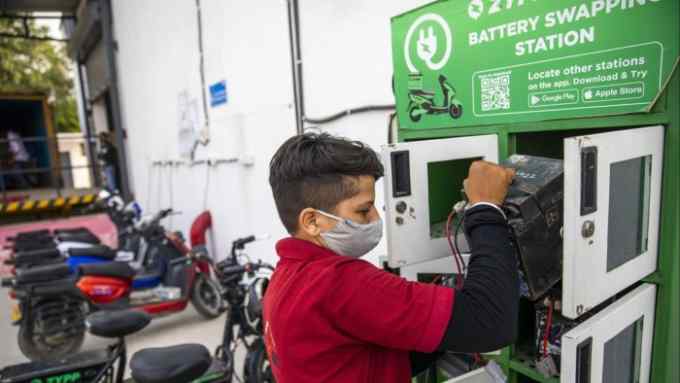Asia-Pacific start-ups adapt to drop in VC funding

Simply sign up to the Asia-Pacific companies myFT Digest -- delivered directly to your inbox.
The long tail of the pandemic has led to lasting changes in many parts of the world. A slowdown in global economic activity, especially in China, as well as declines in industries that initially profited from lockdowns — such as consumer electronics and food delivery services — persist today.
But many of the businesses in the FT’s latest ranking of the Asia-Pacific region’s fastest growing companies are those that continue to reap the benefits of consumer shifts since the start of the pandemic. And they are still riding the wave of cash that poured in during that time. This further widens the gap with newer rivals that are struggling to secure financing amid a tighter funding environment.
Global venture capital funding for start-ups fell from more than $530bn in 2022 to about $340bn last year. Global deal numbers dropped, too, to a five-year-low of 37,808 in 2023, according to KPMG.
Funding weakness is especially pronounced in Asia: down more than 40 per cent to a nine-year-low. In China, this decline is set to continue, particularly as US President Joe Biden signed an executive order last August restricting certain US investments in Chinese high-tech sectors, such as artificial intelligence and chips.
More concerning is that down rounds — fundraisings in which a start-up raises capital at a lower valuation than at the conclusion of its previous round — are growing in frequency.
“Asia VC fundraising has slowed down considerably, reflecting weaker sentiment globally,” says Angela Lai, vice-president at data group Preqin. VC performance has dropped by 23 per cent since the end of 2021, she adds.
But the flipside is that, now, in a time of scarce funding, companies with cash buffers have a greater than usual edge over their rivals. Many have not only benefited from a pandemic-related windfall, but have also adapted their business strategies to keep that growth going.
Face masks are a good example. Global mask sales grew more than 30-fold during the pandemic. That led to a short-term revenue lift, but was also an opportunity for the manufacturers to build out capacity, resulting in long-term production-cost advantages.
“The sales boost during the pandemic has not just helped increase profitability but it has also allowed us to expand our scope into businesses such as lifestyle products, hand sanitisers, third-party logistics, and warehousing without having to rely on external funding,” explains Heesung Kim, the chief executive of South Korea-based manufacturer Aseado, which is placed seventh in the FT ranking.
For most of the world, the steep sales growth in masks has since normalised. But, in Asia, many people still use them despite no longer being obliged to, while others wear them as a safeguard against air pollution.
Telehealth is another area in which businesses have continued to do well. Even as medical service providers quickly shifted from teleconsultation back to their bricks-and-mortar business model, post-pandemic, some incorporated new changes.
At Singapore-based healthcare company MaNaDr this included “training our doctors and working [in] ways to optimise user experience, to get ahead of the competition”, says Kangming Lan, head of strategy at MaNaDr.
The approach has proven successful. Mobile-health Network Solutions, which operates the MaNaDr platform and other healthcare services, filed for a US listing in February which, at the midpoint of the proposed pricing range, would result in a market value of $153mn.
Singapore, the city-state where MaNaDr is based, has grown to become a leading south-east Asian start-up and VC hub, second only to Beijing, according to US-based research company Startup Genome. It is the city in which the highest number of businesses in this year’s FT ranking are based.
Home to about 4,000 tech start-ups, there are 18 unicorns [start-ups with a market valuation of $1bn or more] in Singapore — more than four times the global average. Logistics and transportation company ISO Tank Management and waste management business Skrya, in third and 10th place in the ranking respectively, are based in the city-state.
Elsewhere in the region, “India and south-east Asia are seen as the most attractive markets according to our investor surveys, as they present many early-stage opportunities from wide-ranging sectors,” says Preqin’s Lai.
Electric vehicle delivery company Zypp Electric, which leads the FT ranking this year, and digital agri-ecosystem group BigHaat, in second place, are both based in India.
Longer term, the global investment frenzy around AI is set to have far reaching effects on all kinds of industries.
South Korea’s Aseado has already incorporated AI in its manufacturing processes, through smart factory automation, and in quality checking. At MaNaDr, AI is used with cameras to scan patients’ faces for information, such as relating to blood pressure levels.
“Relative to other markets, we are slightly more positive on Asia, as we see relatively sustained interest from investors,” says Lai. “We also see that VC activity has picked up in the developed markets of South Korea and Japan.”
Companies that managed to grow in the past year also have probability on their side. A prolonged downturn in global VC funding and economic slowdown resulted in more than 500 start-ups shutting down because of bankruptcy or dissolution last year.
As a result, the smaller remaining pool of fast growing, profitable companies stands a much better chance of securing funds.

Comments